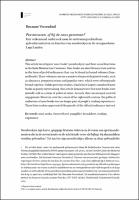Chapter Feestneuzen, of bij de neus genomen?
Een verkennend onderzoek naar de ontstaansgeschiedenis, gebruikscontexten en functies van neusboekjes in de vroegmoderne Lage Landen
Abstract
This article investigates ‘nose books’ (neusboekjes) and their social functions
in the Early Modern Low Countries. Nose books are short literary texts written
in the form of joyful ordinances that can be found in bound volumes (Sammelbände).
These volumes contain a number of separately printed works, such
as almanacs, prognostications and popular texts, which were subsequently
bound together. Unlike previous studies, which have largely considered nose
books as purely entertaining, this article demonstrates that nose books were
initially sold as a form of political satire. As such, they encouraged societal
engagement. However, over the course of the eighteenth century, the political
undertone of nose books was no longer part of people’s reading experiences.
These later readers appreciated the parody of the official ordinance instead.
Keywords
nose nooks, Sammelband, pamphlet, broadsheet, reading experienceDOI
10.5117/JNB2022.011.VERSISBN
9789463727693Publisher
Amsterdam University PressPublisher website
https://www.aup.nl/Publication date and place
Amsterdam, 2022Classification
Netherlands
Library, archive and information management
History: specific events and topics
Dutch


 Download
Download